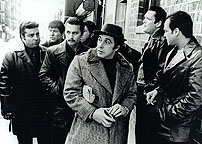
Based upon the true story of 70's FBI undercover agent Joe
Pistone, aka Donnie Brasco, this film draws the viewer into
an world of deals and deceits where it's sometimes hard to
tell the good guys from the bad. Donnie becomes so deeply
involved with the gangster he has been sent to destroy that
he begins to find his loyalties becoming divided.
© Concorde Film, Den Haag

|
Posing as the "jewel man" Donnie Brasco, Pistone (Johnny
Depp) works his way into the confidence of Lefty Ruggiero
(Al Pacino). This is his first move toward opening a
bigger space for himself inside the Bonanno operations and,
ultimately, breaking open their activities. A man
motivated by a mission, Brasco discovers his first score to
be a man who is unexpectedly vulnerable behind a hard
reputation and tough exterior. The deeper Donnie becomes
involved with Lefty and the longer he knows him, the more
intricate their relationship becomes. Lefty gives Donnie
his start by vouching for him and so begins their
partnership. Donnie's loyalty to the mob and dedication to
their activities established, he embarks upon a path to
darkness where he lives on such a fine line that it becomes
almost impossible to distinguish between federal agent and
criminal at times. This line becomes vaguer as his deeds
become more violent and his attachment to the mob
strengthens. The more time he spends with the mob family,
the less he spends with his wife and kids. The secrecy and
danger that enshrouds him begins to take its toll both on
his mind and home. While dealing with these problems, he
is painfully aware that his work could easily, when brought
to its final and logical conclusion, result in a death
sentence for Lefty.
Pacino plays the disappointed washed-up two-bit gangster
whose heyday has passed and left behind little more than a
man who resorts to cracking open parking meters for loose
change. His ironic portrait is sometimes touching,
sometimes sad, with an undertone of a suppressed, but
extremely volatile nature that, though rarely apparent,
could unexpectedly erupt at any moment. Depp is equally
sensitive in his portrayal of a man falling down a chasm
from which he might never be retrieved.
It's wonderful to watch Johnny Depp play opposite Pacino,
both on an equal footing. Depp is so adept at donning the
characters he plays that the untrained eye might easily
miss the wonders he works. Even the real life Joe Pistone,
who was assisting on location with his wife during filming,
admitted that J.D. had acquired his movements, attitudes,
way of talking and even his own walk. (Pistone, who still
has a \$ 500,000 price on his head, lives today under a new
identity). This film is the one to shake those
disbelievers awake who have not yet accepted or understood
the maverick talent on view in such memorable films as
Edward Scissorhands, Ed Wood, Cry Baby, Dead Man, and, of
course, What's Eating Gilbert Grape? He has always been
clever enough to make intelligent decisions about which
roles to accept by basing them upon a good script. Depp
has reached the top, although it was obvious quite a long
time ago that his spot there was reserved. How ironic that
a role with certain similarities to his original attention
catching part in the TV series 21 Jump Street should prove
so pivotal to unequivocally establishing his place for any
remaining doubting Thomases. See, you sceptics, he's not
just another pretty face.
Scriptwriter Paul Attanasio (Quiz Show, Disclosure) has
done a fine job adapting Joe Pistone's book Donnie Brasco,
My Undercover Life in the Mafia for the screen. What
places this film above the run-of-the-mill gangster film is
the definition of the main characters and the intricacy of
their personal involvements with each other. It becomes an
intimate portrait of friendship and fidelity while
maintaining a suitable distance from the predictable
banalities often associated with the contemporary gangster
film. In other words, "fuggedaboudit" (if you know what I
mean).
Superb points for director Mike Newell who adds a few more
funerals to his list this time around. A native of
England, he spent some time getting the feel of the real
location: "I spent some time in Brooklyn where these guys
are still running the same kind of businesses they always
have: gambling and loan sharking and so on. I would go
out on the weekends, drink and eat with them and hang
around in their social clubs. Obviously, there was a lot
they wouldn't show me, but I saw as much as I could. It
was like being let into the heart of the tribe. They were
very generous to me and I became very fond of them, so I
had to remind myself that they also did horrendous things,
that these men that I was having such a good time with were
also ... well, I didn't really want to know." (Well, Mike,
Brooklyn probably ain't never gonna' change much, even if
the Dodgers did leave.) Superb points as well for Director
of Photography Peter Sova who has framed each section of
the film so beautifully and effectively that the pulse of
the story seems to reach out and grab you. It's also nice
to see Zelijko Ivanek back on screen once again, even if it
is in a supporting role.
© 1994-2006 The Green Hartnett
|
